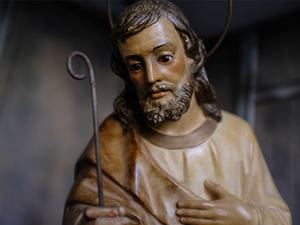
We hear the phrase “history repeats itself” so often it has almost become trite. Almost. It still carries powerful significance because it’s so true!
One of the primary reasons God asks us to keep records (including personal journals) is so we can remember—remember the many times he has blessed us, the kind people who have entered our lives, the good and bad things we’ve done, the good and bad things our ancestors have done, and more.
I’ve personally benefited from the examples and trials of the early Christian saints, who taught us (at least) seven useful lessons.
God always keeps his promises.
Even when we think he must surely have forgotten about us (and with good reason, we might convince ourselves), he never abandons us or acts contrary to his word.
How many times does he have to prove that for us to believe it? And how long must we wander aimlessly trying to “find ourselves” when our true identity is found in him and his Son. Said C.S. Lewis in Mere Christianity: “It is when I turn to Christ, when I give myself up to His Personality, that I first begin to have a real personality of my own.”
How profound is that? (Read pp. 225-227 of Mere Christianity for the fuller, brilliant message.)
God is involved in every aspect of our lives. He is not a “God of the margins,” filling in where the “world” can’t satisfy us. He and his son make literally everything richer, fuller, and more worthwhile, no matter how large or small. Our faith brings us closer to them, amplifying and multiplying the miracles – which will continue to increase at the same time Satan’s kingdom grows more powerful and brazen in its persecution of the believers.
Peace through the Holy Spirit can be constant.
Christ gave a clear promise to his apostles and disciples, recorded in John 14, regarding the Comforter. Through eternal perspective developed and enhanced by prayer, obedience, service, kindness, and searching the scriptures, his peace abides, even when we naturally grieve because of the vicissitudes of life and the malevolence of others.
The fallen nature of this mortal world spawns sharp suffering often made far worse by the selfish and unwise use of our precious agency. But suffering offers opportunities to give and receive service, to learn to love as Christ loved us, to reach upward and partake of healing waters. Jesus voluntarily suffered and endured all things on our behalf, despising the shame of the true king being mocked as a false, impotent imposter. He empathizes perfectly with us. (See Hebrews 12:1-2)
War is truly horrific.
If often brings out the worst in us, even when we’re not the ones doing the actual fighting. It sometimes humbles us, too, but at what cost? The early saints witnessed the bloody “Year of Four Emperors” in Rome, the brutal siege of Jerusalem, and the martyrdom of most of the original apostles, and carried on.
Lucifer revels in such physical and spiritual destruction, while the heavens mourn. The best soldiers and military leaders are those who pursue and defend noble objectives with the least amount of death and suffering possible, and who constantly seek the Lord’s guidance to draw that difficult line. Cornelius, most likely, was such a man, which is another aspect of his life which makes his conversion so interesting.
In fact, as soldiers of the New Covenant, our mission isn’t to seek and destroy the enemy, but to seek and save the enemy whenever and wherever we can. That would have been an interesting lesson for a decorated centurion to learn.
When our body dies, our legacy lives on in the lives of all those we’ve touched, for good or ill.
Christ acknowledges our legacy as well, and will ultimately judge us on it, perfectly, which is both comforting and a little concerning. Some worldly legacies might survive for a time—sometimes a considerable amount of time—based on lies, but ultimately, the truth will emerge and lay everything bare.
Christ himself said, “For nothing is secret, that shall not be made manifest; neither anything hid, that shall not be known and come abroad.” (Luke 8:17)
We still don’t know when Christ will return.
It might be tempting sometimes to ease up in our efforts to build the kingdom of God, taking solace in the fact the Savior will return “soon” and that we’re “safely” on the right side.
But then there’s that fascinating and eye-opening parable of the talents. What happened to the person who hid the talent, ostensibly to keep it “safe?” Yikes. (See Matthew 25)
We are called to the work, to help the Lord save souls and relieve suffering, and to hasten his coming. It is not time to relax, or to shrink from the very real fight for truth and righteousness.
God governs in the affairs of men.
Benjamin Franklin famously noted that during the U.S. Constitutional Convention almost 235 years ago. He also recognized that God could influence those holding the reins of power in a multitude of ways, sometimes through the good examples of his people, and sometimes through their brave sacrifices.
God often utilizes the perceived “weak” things of the earth to confound and thrash the “mighty” and “wise” ones. The apostle Paul, for example, was a surprising choice for a champion; someone like Barabbas would have been as well (if he chose that path). Said Paul himself: “But God hath chosen the foolish things of the world to confound the wise; and God hath chosen the weak things of the world to confound the things which are mighty.” (1 Corinthians 1:27) Lucky for us!
The Lord utilizes the talents of all his saints, men and women, rich and poor, well-educated or not, in amazingly powerful ways. Men and women counseling together and seeking the Spirit drove the fantastic, unimaginable growth of the early Church following Christ’s resurrection. They were builders and healers, not conquerors or destroyers. They boldly stood for truth and righteousness, though such a stance often put them in grave danger. They weren’t perfect, but they provided us a powerful example to follow.
Patience is the hallmark and bulwark of Christians.
“God’s timing is designed to teach us how to trust.”
I saw that phrase used in a meme posted on The Chosen’s fan page on Facebook, and it rings so true. No wonder I must wait so long sometimes. I don’t trust him enough. Though I’m trying, I promise.
You’ve probably wondered why Abraham and Sarah had to wait so long to have a child, wondered again why God would ask him to sacrifice that miraculously conceived son, the one through whom the great promises made to Abraham were supposed to be fulfilled! God was opening Abraham’s mind to comprehend the full scope of his purpose with regard to his children, and Abraham rejoiced in that knowledge.
The more we can come to trust God, the more he can teach us. Our potential is unlimited, and there is no finer teacher anywhere in the universe (which is an incredibly big place).

